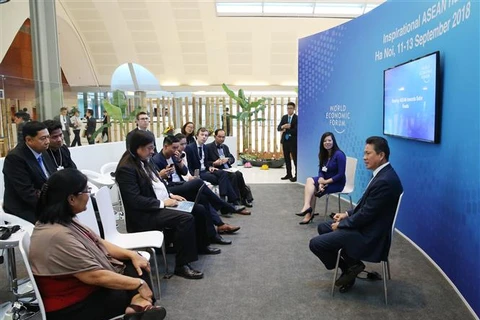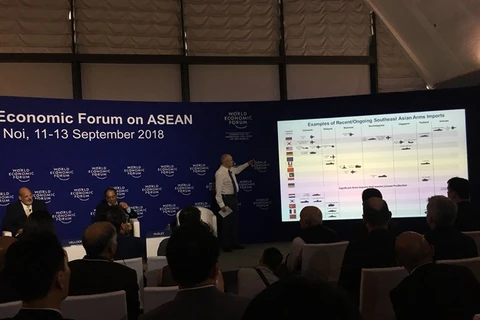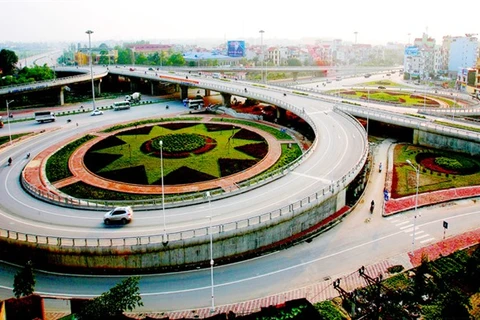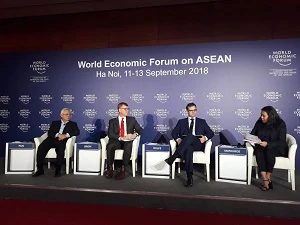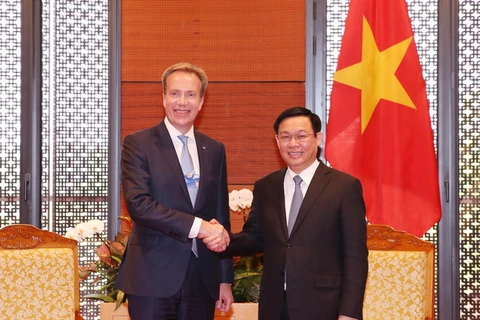 Christopher Marks, Managing Director, Head of Emerging Markets Corporate Banking Division for EMEA, MUFG Bank
Christopher Marks, Managing Director, Head of Emerging Markets Corporate Banking Division for EMEA, MUFG Bank Hanoi (VNA) - Vietnam is one of the really special cases worldwide that will be able to take full advantage of all new opportunities in the Fourth Industrial Revolution (4IR), as told by a senior financial expert on emerging markets on September 13.
Christopher Marks - Managing Director and head of Emerging Markets Corporate Banking Division for EMEA, MUFG Bank - Japan's largest bank and one of the largest globally, with offices throughout Japan and in 40 other countries - is in Hanoi attending the 27th ongoing World Economic Forum on ASEAN (WEF on ASEAN). He grants an interview with the Vietnam News Agency on the sideline of the forum.
The following is the full text of the interview.
Reporter: How will Vietnam take advantage of the Fourth Industrial Revolution in comparison to other emerging nations worldwide?
Christopher Marks: Vietnam is arriving at the Fourth Industrial Revolution with less institutional constraint, a young population, particularly with a very strong and forward-looking leadership in terms of government. In many ways, Vietnam has the flexibility that some new economies don’t have to adapt to the 4IR. Things can be built up from here in a way which other economies with different kinds of resources may not have that flexibility.
In 10 years, we don’t really know what the composition of Vietnam’s GDP will be, but it will be more diversified than some of its neighbouring nations which are relying on older industries.
Reporter: What are some of the advantages that can help ASEAN nations unlock the benefits of the 4IR?
Christopher Marks: Fundamentally, the great advantage of the ASEAN region compare to other parts of the world is, of course, the relatively huge population of around 650 million. The region’s relatively young population means that so many parts of the population know what telephones and the internet are. They don’t even need to adapt. All of you younger than I am have grown up with technology, therefore the adaptation and penetration rate will be very high.
We have to mention that young people are also vulnerable to the impact of internet and technologies. I believe social media, social activities on the internet have both positive and challenging aspects. But what is true is that young people grow up with the capacity to learn very quickly and adapt even better in social way.
Taking example of gaming, think what the game contains: voice technology, a lot of visual technologies, a lot of automatic control built in. So, for the section of young people who can understand that, they can get excited about magical components of those games and hopefully they will lead them to more productive application and adaption.
Secondly, we can say that the ASEAN region sits in the part of the world that continues to grow very fast. So there are great opportunities for the application and adaption of new technology in different ways. But it has to be application and adaption in sections and part of the economy relevant for each of the countries in region.
Reporter: In your view, how will ASEAN evolve in the future with the advantages it takes from the Fourth Industrial Revolution?
Christopher Marks: Look at the success of a place like Singapore. It has been able to evolve its focus over time, originally as a manufacturing centre, now with much higher value as a service centre.
It is true with the rest of the ASEAN region. Some parts of the region are not very advanced today. They can pick and choose education and dedication to where some of these technologies can be applied to sectors that suit their population and the composition of their economies.
For example, in agriculture, a lot of technologies can indeed be contained in a telephone to improve the yield of farming. Farmers can have better access to different markets, they can educate themselves.
Social sectors like healthcare, of course, can also evolve into powerful areas. Medical staff have the power contained in telephones and other applications. This is a great opportunity set, even countries with different requirements and objectives can take full advantage.
Reporter: The Fourth Industrial Revolution has been making drastic changes across all aspects of economies. How does the financial and banking sector benefit from technology?
Christopher Marks: From a finance point of view, not only from a commercial and private banking point of view, but even with public finance, one of the greatest innovations is not just in terms of e-commerce, but in the availability and adaption of internet in banking.
Now, you can bank on telephones as you know. As smartphones become more and more available and less expensive both private banking and government banking can, of course, gain a lot of new clients. More savings can be redirected into the economy in terms of investment.
You don’t need some of the old fashioned systems that we used to enjoy ten years ago. All you need is a telephone. At the point of purchase, the government will capture taxes, individuals receive their goods, merchants receive their money. So in the Fourth Industrial Revolution, those who are ready for it will be happy.-VNA
